Often our cultural paradigms for fidelity and sexual propriety are, frankly, seemingly low-testosterone, low-sociosexuality cases. Of course Mr. Rogers is going to be faithful to his wife (although I don’t claim any knowledge of his T-count). Or all those skinny Mr. Darcy-type, regency period love interests that Mormon women are obsessed with (another post for another day).
This isn’t bad necessarily, I’m not shaming low-T men, nor am I conflating manly strength with traditionally masculine traits, but there’s a limit to the extent to which a Mr. Rogers type can serve as an example on sexual issues or speak to men and young men who are not so inclined. And as a father of boys I want to be able to draw on examples of manly men who aren’t just faithful because they’re demisexual, gray-asexual, or sometimes just plain asexual (again, nothing wrong with that), but men for whom their faithfulness and respect for women is an extension of, and not simply in spite of, their traditional masculinity (and no, not all traditional masculinity is toxic, although some is).
Since for many male adolescents sex is the driving issue of their existence, how exactly it is channeled and normatively framed is huge, less they become a Andrew Tate or yet another 35-year old masturbating in their mother’s basement. So my antenna is constantly on about what kind of pro-chastity messages I can feed into their media diet in a non-ham-fisted, non-preachy way. Of course there’s no problem with preaching occasionally, but ideally it would be great to pair explicit gospel messages with the kind of social media influences that say the same thing, like that book about how to sneak vegetables into your kids’ food.
So on that note, below is my list of potentially useful examples of high-testosterone, masculine fidelity in the popular media.
Maximus in Gladiator
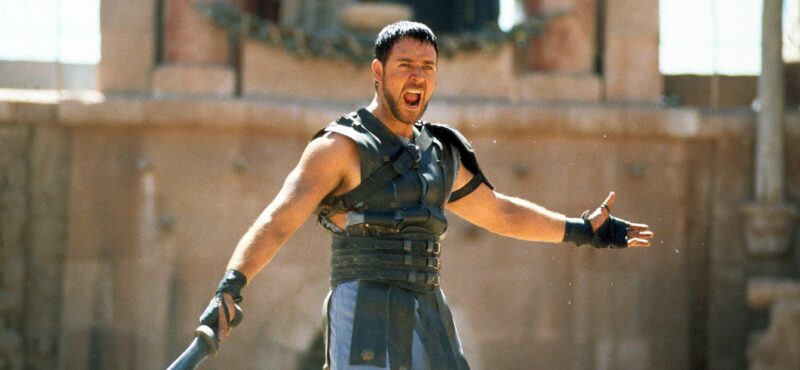
This is the “S-tier” example. It’s hard to get more masculine than Maximus. His passion for his wife is supplemented, not detracted, but his masculine aggression when his desire for making right the death of his wife translates into winning in the arena. Also, a very tear-jerky ending scene that should have a particular appeal to us with our afterlife theology.
John Wick
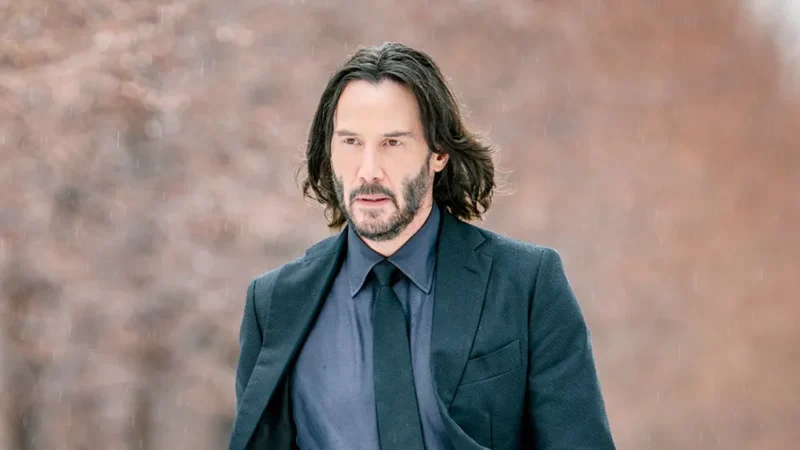
John Wick is a similar situation, although sometimes with him there is destruction for destruction’s sake…which can be fun sometimes. The sap here is a little over-the-top, but massacring the people who killed the dog your deceased wife sent you is pretty, base? Dope? (Is that what the kids say these days?). The violence is also a little over-the-top (I mean, it’s John Wick), but the animating force here is his devotion to his wife, not vengeance or just shooting people to be cool like it is for a lot of other movies.
The Godfather

The scene I’m thinking of in particular here was when Michael Corleone arrives at Las Vegas and his brother Moe offers him a bevy of women to enjoy before their meeting, and he very coolly shrugs them off so they can get down to business. I’m not a James Bond fan, but it seems like for some of the more recent iterations the writers tried to go in this direction, where Bond is simply above using sex to fulfill his own carnal desires when there are bigger issues at play. I don’t know if the Bond franchise kept going in that direction, but it’s the same vibe as Michael Corleone.
The Northman
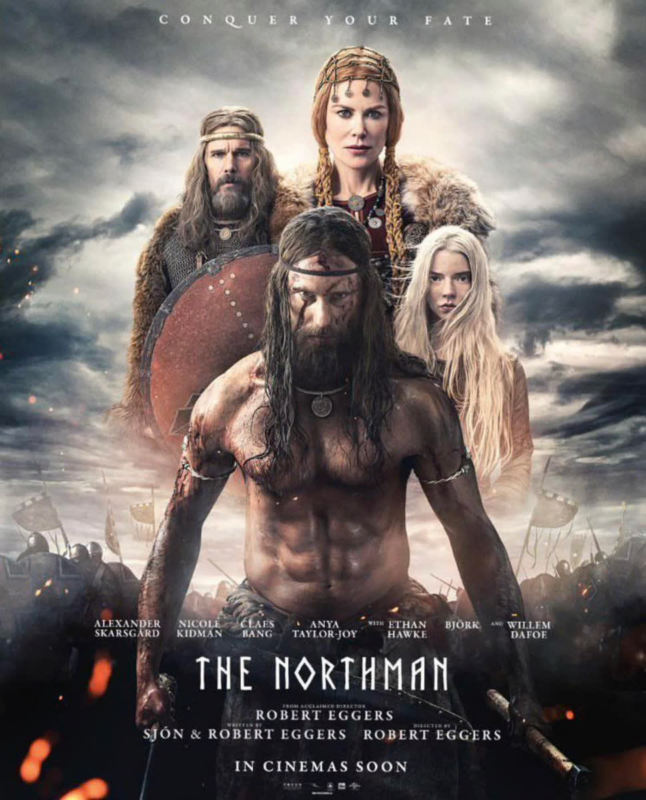
Okay, this one is going to get me in trouble, but let me explain. The Northman is clearly an anti-hero with all sorts of toxic masculinist traits that I do not want for my sons, but he also isn’t a one-dimensional evil character. Let’s say the film doesn’t take late-stage, post-Christian morality as its taken-for-granted background framework, and in including him on this list I’m not endorsing most of what he does in the movie, but if we could figure out how to capture the sense of kinship; family obligations to spouse, ancestors, and descendents; willingness to fight and die for family, and “turning the hearts of the fathers to the children and the children to the fathers,” without burning Ukrainian villages and enslaving people that would be great. (Of course, it would have been better had he stayed and helped raise the kids instead of pursuing a blood vendetta).
Pulp Fiction
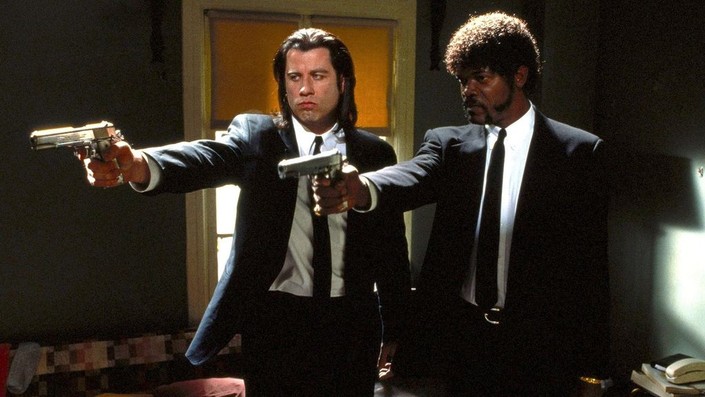
I’m also not going to win any father-of-the-year awards for watching Pulp Fiction with my kids, although Vidangel helps. The scene I’m thinking of here is when Samuel L. Jackson’s hitman character exclaims (right before shooting somebody of course) “Mr. Wallace doesn’t want to [edit, edit] anybody but Mrs. Wallace!” And yes, I know a comical aside by a gangster shouldn’t be read into too seriously like it has some profound meaning, but still, the fact that Marcell Wallace’s spousal relationship with the Uma Thurman character is sort of taken for granted throughout the movie is meaningful when the operating assumption with gangster types, like in The Godfather, is that they have all these side options, so the idea of a traditionally monogamous marriage doesn’t quite fit.
300
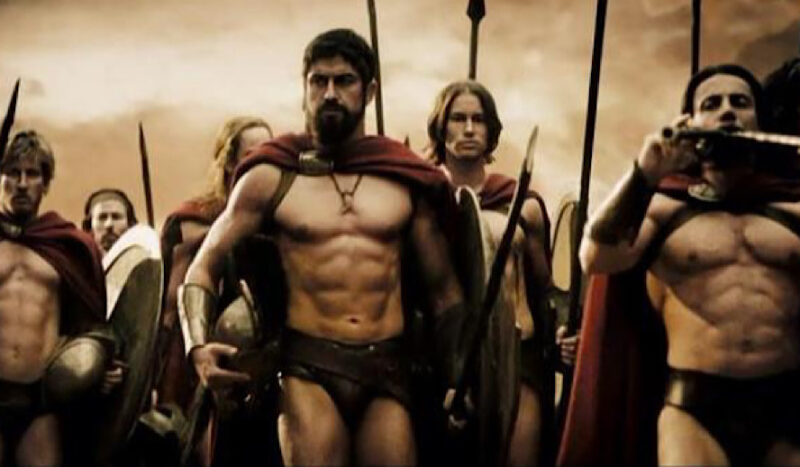
Leonidas throws the Persian emissaries into a pit for, among other things, insulting his queen, and looks to her for permission before doing so. He relies on her heavily for advice on how to handle the impending invasion. Here the hyper-masculinity goes hand-in-hand with a matriarch-as-equal-partner rather than an aggressive man simply dominating his wife. The hyper-masculinity is an extension of respect for their wife’s authority, and not something to dominate her with. [CW: There is a little bit of homonegativity, but since he talks about “boy lovers” I’m going to interpret that as pederasty and not homosexuality per se. Plus the actual Spartans were very bisexual, and didn’t see non-receptive homosexual sex as being sissy in any way.]

Comments
23 responses to “Masculine Fidelity and Sexual Propriety in the Media”
Quite the post Stephen! I think you have a good point about the current media portrayal of male sexuality being essentially neutered men. But I think the fact that it’s so widespread means that you’ll have to be preachy with all of the films you mentioned anyways.
The message most teenagers will take away from these movies is “ventilating Russian mobsters and Persian immortals is extremely cool” or “I’d love to be so busy committing felonies that scantily clad women hold no allure for me.” It’s true that the movies’ protagonists are, in some cases, motivated by love of their wives, but I you’d constantly have to asterisk that with “spartan kicking your crush’s brother is not an appropriate way to ask her to prom.”
Essentially, the higher testosterone masculinity you want your boys to model is either so subtle (Pulp Fiction and the Godfather) or accompanied by such implausible violence (The Northman, 300, and John Wick), that you’d end up having to be preachy anyways. That, or just watch only Gladiator.
Unfortunately I think the days where we could rely on the broader culture to inculcate a lot of important values in our kids are fast receding. So we will have to find a way to both be comfortable being more preachy, and inspire enough love and loyalty in our teenagers that they listen to our preaching over the world’s.
All that is fair, but fairy tales can impart important values even if there are no talking frogs. But yes, you’re right that some preaching is inevitable.
Also, to clarify, it’s not so much that I’m *trying* to get my kids to be high-T; again, I’m not taking a position on what’s better (besides, it’s not like I have a lot of influence on that). Rather it’s, if we already have that double-edged disposition to work with, how can I channel it into appropriate avenues using popular culture instead of fighting against it?
Our English word “virtue,” often used since Victorian times, and especially in the Church, as a substitute for chastity or sexual purity, traces back to the latin “virtus,” meaning “manliness, moral strength, high character, bravery, excellence.”
I think Mr. Rogers is the perfect example of being Christ-like in public and keeping his sexuality and “T-count” private, known only to himself and his wife. That’s the correct message to be teaching our kids–not the violence/murder examples detailed above.
Aragorn?
I will just keep this short. Women prefer Mr Darcy to Kahn the Barbarian. Women prefer Mr Rogers to Spartacus. I would not argue that the guys women think are sexy are lacking testosterone just because they are smart, polite, and kind. No, wise up guy, smart, polite, and kind IS sexy and it is a secure confident masculinity instead of the insecure dude who needs to prove his masculinity. Listen to smart women about what is masculine instead of paying attention to the insecurities of Hollywood.
Happily married for 45 years to the kindest, most generous man I know. He’s a great husband and father, an all around wonderful person.
I wouldn’t want to be in the same room with your examples. I’m not sure this post is meant to be taken seriously, so I’m not sure whether to say it’s very silly or it’s very sad.
In response to PWS, I believe it’s meant to be taken seriously, and yes, it’s sad. Equating masculinity with violence and domination, and thinking these types of characters are a good role model for boys because they are faithful to their wives? Referring to men who ARE good role models as “low-testosterone” and “low sociosexuality cases”?
That’s an intentional misreading of the post. As I said multiple times in the OP and comments, the point isn’t to disparage men without traditionally masculine “high-T” traits, or to celebrate the toxic elements that sometimes stems from such traits, but rather to ask what kind of messages we can find for boys who are already disposed to being on the more “traditionally masculine” side of things. Yes, a Mr. Rogers shouldn’t be told to man up, but there are also limits to telling a high-T boy to simply be Mr. Rogers when that’s clearly not who he is.
You need some better representation of masculinity. Most of these movies are just violent have very poor retention of “masculine virtues.” Some of your male characters in your recommended list I would classify as pretty poor examples of masculine virtues and behavior.
There are so many movies I recommend with male masculine characters worth watching:
1. Last of The Mohicans with Daniel Day Louis – one of the few movies that is better than the book by exponential levels. Daniel, his adopted brother and father are excellent masculine role models and amazing soundtrack with some American history.
2. The Hunt for Red October – Sean Connery, James Earl Jones, Alec Baldwin, Sam O’Neal. Strong smart, principled men do courageous things all through this movie.
3. The Martian – Matt Damon sciences the s@&$ out of being left behind on mars and survives. Smart, funny, tough.
4. The Man from Snowy River – an old movie that we watched when I was a kid till the tape broke in the VCR. If you want to show what growing up into a masculine man looks like this is still 100,000x better than 300 or pulp fiction.
5. Sneakers – Robert Redford is a hacker that escaped prosecution and now leads a ragtag team of hackers that test security systems for a living. A Russian mathematician’s solution to defeat encryption pulls him and his team into a fight between organized crime, Russian and US intelligence.
6. Sweetland – a quiet movie about a Norwegian farmer in the 1920s or 1930s and the German bride his parents send for him to marry. How hard he works and what he is willing to sacrifice for his friend is more masculine than murdering people any day.
8. Iron Will – more of a kids movie about a young man that competes in the iditorod sled race to save the farm. The kind of toughness and tenderness that real men should be.
9. The Boys in the Boat – about the rowing team from the US that went to the Olympics right before WWII. Hard work, competitive, love story, standing up for principles. Really great movie about real tough men.
10. The Imitation Game – breaking the German Ultra code and building the first computer that helped win the war against fascism. Yes the main character is gay, but a better masculine character than any hitman or murderer. Defeating fascism with your brain and working together with a team.
If we want our your men to have “masculine” virtues than they need more than movies that say masculine men are violent. Strong men are also smart, kind, generous, strong, honest, gentle, and loving. Something on the lines of the scout motto.
What about Joseph Smith? His T-count was off the charts. I’m guessing my wife would not appreciate me having sex with her best friends or their daughters behind her back.
Brian: That’s a great list too (at least for the half of them that I’ve seen), but again the point isn’t just examples of good masculinity, but traditionally “high-T” masculine examples that have some subtle messaging about faithful sexuality (even if it’s hidden in some not so great messaging). To have a perfect everyman could be too on-the-nose or preachy, but to have pro-fidelity message hidden or incorporated into places where it might not be expected might be more impactful.
But on that point, some of your examples actually dovetail with mine quite nicely. There is that sweet moment when Marco Rameus talks about the Bible that he keeps from his late wife for sentimental reasons….which is immediately followed by him killing the political officer by smashing his trachea against a table, and while he’s no John Wick, if memory serves the Daniel Day-Lewis character in Last of the Mohicans kills quite a lot of people defending his love interest. But yes, good examples of masculinity in general (which, as noted, would include Mr. Rogers) would be a much broader list.
Apocalypto
Stephen, I’ll play. How about the main character in the two Extraction movies from Netflix? Played by Chris Hemsworth, Tyler Rake is an ex-Australian SAS operator working for a black world security firm that specializes in getting clients out of sticky situations for a large fee. Despite the name (and face), Rake doesn’t run around or objectify women, though we learn his wife left him after the death of their son prior to the first movie. It is on the order of John Wick as violence goes, but he’s more of a “good guy” than some on your list.
I think your examples of high T masculinity are toxic. Maybe that is the T you were going for. That they are “faithful” to the memory or actual women they care about does not redeem them.
Rocky was a god fearing catholic and loyal to the end to Adrian.
Last of the Mohicans ran into death multiple times to rescue women and others in need.
Thor was pretty loyal to Jane (if that’s her name?)
Aragorn and Arwen
Superman (most of them)
Braveheart was pretty committed to his lady
Commando was a good father
Unforgiven is a mixed bag or morality, but shows tough repentant guys avenging wronged women
Saving Private Ryan
Kingdom of Heaven has some potential
Dances with Wolves
I guess the Patriot fits into the tough father motif
Gettysburg is not necessarily female oriented but real human men doing insane things for duty
I hope there is far more to proper masculinity than sexual fidelity to one’s wife.
But still, there is a foundation for a good discussion here. Young men (and old men) no longer have the physical releases that would accompany real hunting for needed food, being prepared to protect against threats, chopping wood, digging wells, and so forth. They are no longer needed as the major provider for their families. And they are no longer expected to be the decision make for their families. The substitutes (such as video games) are very poor substitutes.
Times have changed, but basic human psychology hasn’t changed. If parents, the church, or other societal elements don’t address these matters, deznats and neo-nazis and so forth will try.
I don’t agree that looking to movies is the right answer, as there is far more to proper masculinity than sexual fidelity to one’s wife, but I support OP starting a discussion.
Is coaching high school football in Texas high-T enough for you? If so, I nominate Coach Taylor, who made his living supervising youthful violence without killing anybody or being unfaithful to his wife.
I really don’t like the reductive dividing of men into “high-T” and “low-T” and the assumptions about the two groups. Yes, testosterone is associated with libido and aggression. But how much of the variation in male behavior does it actually explain? I’d guess very little. If we could actually determine a man’s testosterone level just by observing him for a bit, we’d save a fortune on medical tests. Seems like we’re mostly using testosterone as a shortcut way of talking about a cluster of stereotypically masculine behaviors, which is fine in moderation, but let’s not fall into testosterone essentialism. I have not noticed much correlation between struggles with chastity and stereotypical masculinity among the young men I’ve known. Let’s also not assume that just because a man is successful at controlling his aggression and sexuality it must be easy for him because he’s “Low-T.”
Mr. Darcy’s initial unwelcome proposal to Elizabeth Bennet is classic testosterone-driven entitled male bad behavior, as is much of his conduct up to that point, so I’d put him in the “High-T” category. But when she calls him out on it, he changes (his behavior, presumably not his testosterone level). If young men want to know how to make young women swoon, let them watch Colin Firth’s Mr. Darcy and take notes. Yes, there’s Pemberly, ten thousand pounds a year, and looking good in a wet shirt, but he had all that when she rejected him. Also note what kind of woman being a Wickham gets you.
Aragorn definitely belongs on the list: fighting to save the world while refusing to take advantage of Eowyn’s infatuation with him. Just make sure Tolkien’s Aragorn is fixed in their minds before you expose them to Peter Jackson’s.
If you want a movie character who sacrifices to do his duty as a man, fights to protect his family and his community, and rejects sexual temptation in the process, I nominate George Bailey. And he does it in a way that’s much more likely to be relevant today than swinging a sword: running an ethical business that actually makes his community a better place rather than worse. The bonus “beware of oligarchs” message is also timely. (If you really need some violence to see someone as masculine, consider what Jimmy Stewart was doing before filming It’s a Wonderful Life. To be blunt, he probably killed more people than all the other actors discussed in this post combined, and I don’t intend that as criticism. I’m guessing the scene where he snaps at his daughter is so real because he let his PTSD out.)
But in the end, the role model all men need to imitate, regardless of their testosterone level, is Jesus Christ. And Fred Rogers did that more successfully than any of the characters in the post. Now that’s a high bar and if a young man can’t imagine reaching it, then strengthen his faith in the atonement of Christ and the mighty change of heart. If he’s worried that he has to lose his identity and personality in the process, assure him that’s not true. But if there’s any hint that he doesn’t want to be like Mr. Rogers because Mr. Rogers is too kind and gentle to be a real man, then he has absorbed some very false ideas about masculinity from our culture and the sooner they’re gone the better.
ji and RLD, yes!
Thank you for thoughtful responses and suggestions regarding a very real challenge.
My wife and I watch detective finding murderer type TV shows. The British and Australian shows follow clues and eventually find the culprit. They then quietly arrest him/ her possibly even putting their arm round them and encouraging them to come to the police station.
We stopped watching American shows because they all seem to involve so much yelling, screaming and rushing around with guns drawn. Response to your gun culture? Is that gun culture part of the problem you are seeking to address?
It’s interesting that a number of the OP’s examples are fidelity to the spouse after the spouse’s death. This is an easy fidelity. It requires very little in terms of actual s3xu@l fidelity. Fidelity during marriage is easier as well, because (hopefully) the s3xu@l relationship is happening and thus both partners are satisfied.
The challenge is how to find (or better yet, create) messaging in popular culture that supports male chastity prior to marriage as a form of respect toward women. It’s a tough thing to ask of boys/men (and even tougher when [email protected]@tion is considered a giant no-no). In clean/Christian media it’s ignored rather than addressed or addressed badly. In a lot of popular media (particularly books), male promiscuity is still a device to define Character. High-T, male promiscuity is glorified and seems to have no relationship to Fidelity at all. A woman getting a promiscuous man to 100% commit is also glorified (a good chunk of the romance novel industry pulls on this trope/wish-fulfillment).
RLD,
Thanks for slapping down the (likely unintentional) misandry about Testosterone.
Testosterone is a necessary sex hormone. I can’t imagine talking about depressive or gossipy women having too much estrogen or something like that.
LL, and everyone else, what if that aggressive toxic male behavior we are so quick to dunk on is the other side of the coin of depression and anxiety? What if it’s just as hard to control aggressive responses to stressors as it is depressive and anxiety inducing ones?